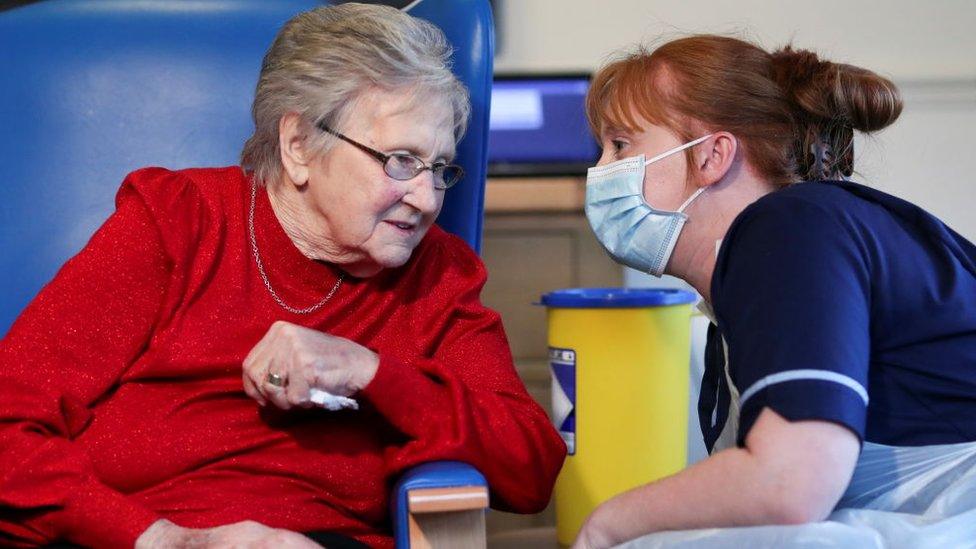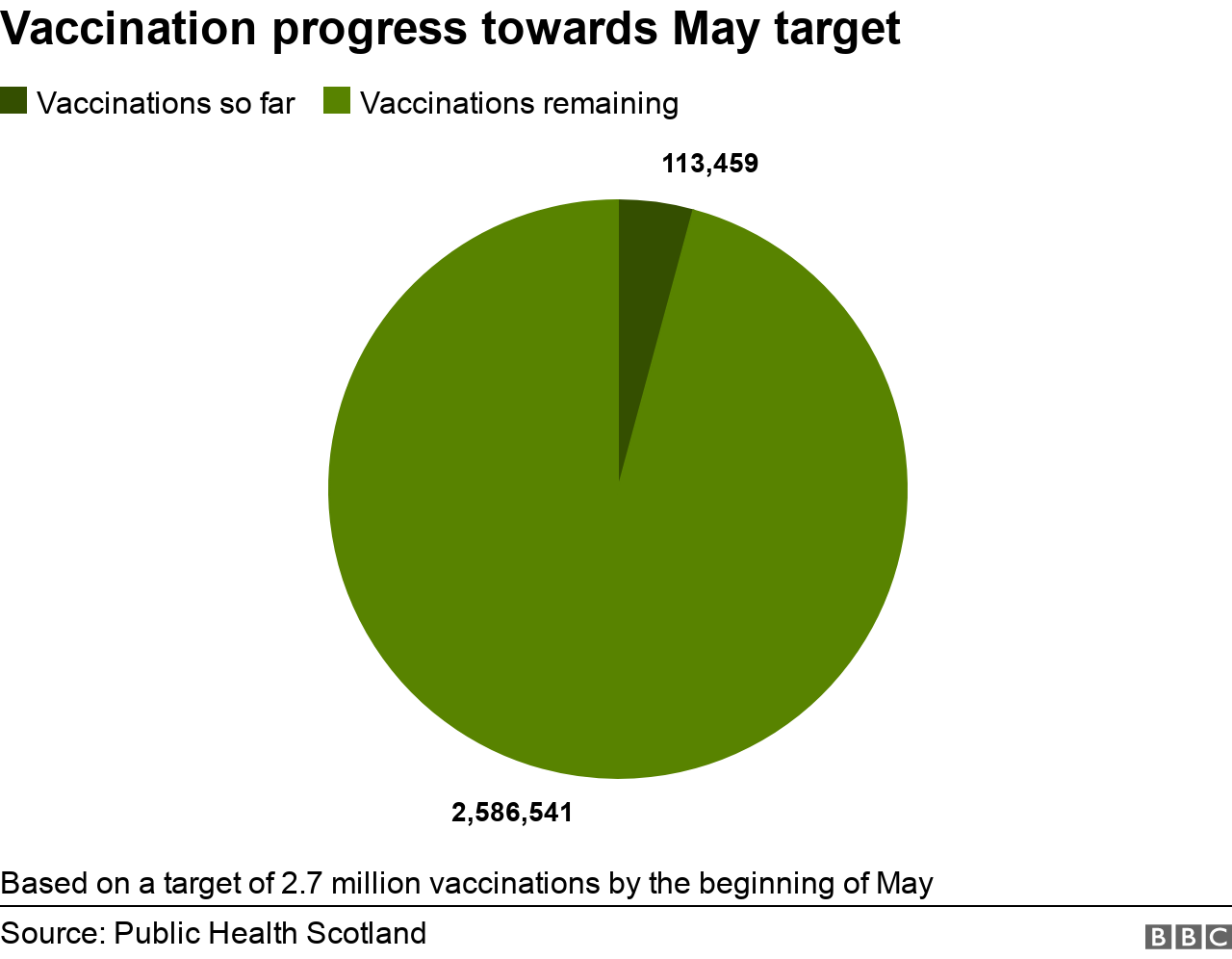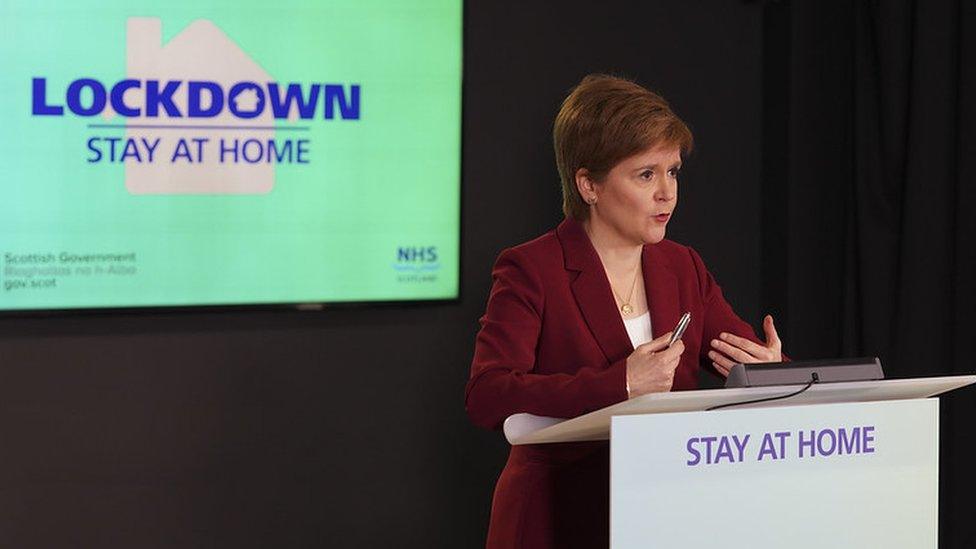Covid in Scotland: 'Well over half' of care home residents vaccinated
- Published

Medical staff are "well over half way through" vaccinating Scotland's care home residents with their first dose against Covid-19.
The first minister said this was "extremely important", as care homes accounted for more than a third of Covid-related deaths in the past week.
By Sunday more than 113,000 people in Scotland had been given their first dose of the Pfizer-BioNTech vaccine.
Some 1,100 vaccination centres are set to be operational within a week.
The government has set a target of giving a first dose to everyone over the age of 80 in Scotland within the next four weeks.
Scotland has about 30,000 residents living in care homes for older people.
A further 78 deaths of people who had tested positive for Covid-19 were announced on Thursday, the highest daily number during the second wave of the virus.
Meanwhile, the National Records of Scotland said the virus had been mentioned on 183 death certificates in the week to Sunday - with 63 of these deaths occurring in care homes.
First Minister Nicola Sturgeon said this underlined the importance of rolling out the vaccine in care homes, saying it would hopefully start to significantly reduce the risk of residents dying due to coronavirus.
And she said the government would start issuing a daily update on how many people had been given the jab from next week.
The first minister said: "Vaccination ultimately is what will provide us with the route out of this pandemic, so we are absolutely determined to make sure as many people as possible are vaccinated just as quickly as it is possible to do so."

As of Sunday, a total of 113,459 people had been given their first dose of the Pfizer-BioNTech vaccine in Scotland.
The Oxford-AstraZeneca vaccine began to be rolled out on Monday, and will be reflected in statistics from next week.
A total of 36 people have had a second dose of the vaccine, with efforts now focused on giving a first jab to as many people as possible
This means that people will now not receive their second dose for up to 12 weeks rather than within 21 days - a move that has been criticised by some medics.
But Chief Medical Officer Dr Gregor Smith said the first dose gave "substantial" protection against the virus.
The vaccine is being rolled out to health and social care workers in the first instance, then care home residents and other over-80s.
Eventually everyone in Scotland over the age of 18 - a total of 4.4m people - will be given a jab, although the government has refused to set targets beyond the initial phase due to uncertainty over supplies.

Nicola Sturgeon has said Scotland is in a race between the vaccine and the virus
The UK government had already committed to publishing vaccination figures on a daily basis, and the Scottish Conservatives had been pushing for the Scottish government to follow suit.
Tory leader Douglas Ross said that "publishing these numbers will increase transparency and give the public confidence that progress is being made in our fight against Covid-19".
The MP told BBC Scotland that he had been getting inquiries from constituents about when they could expect to get a jab, saying people "need to know roughly where they are on that list and when they can expect to receive that vaccine".
Scottish Labour called on the government to backdate the statistics and to publish "a detailed breakdown of how many people in each priority group has been vaccinated".
The party's health spokeswoman, Monica Lennon, said: "Quicker progress must be made on securing vaccinations sites and vaccinators, including the contribution that community pharmacy teams can make."
At her daily briefing, Ms Sturgeon said over-80s should not worry if they had not yet been contacted about a vaccine appointment.
She said these were being "aligned with availability of supply" in different local areas.
The first minister said there was "no need to phone your GP", and that people would be "contacted with an appointment as soon as possible".
'Radical' reduction in contacts
She also said the government was considering "as a matter of ongoing review" whether tighter restrictions may still be needed.
Scotland has been in a new lockdown since Tuesday, and Ms Sturgeon said it was "probably too early" for this to be reflected in the number of new infections.
However she warned that the number of interactions people are having needed to be "radically" cut in order to slow the spread of the virus.
She said shutting down construction, manufacturing and click-and-collect businesses was "the kind of thing we need to look at if we have a concern that we are not sufficiently reducing the number of people who are out and about and interacting".

